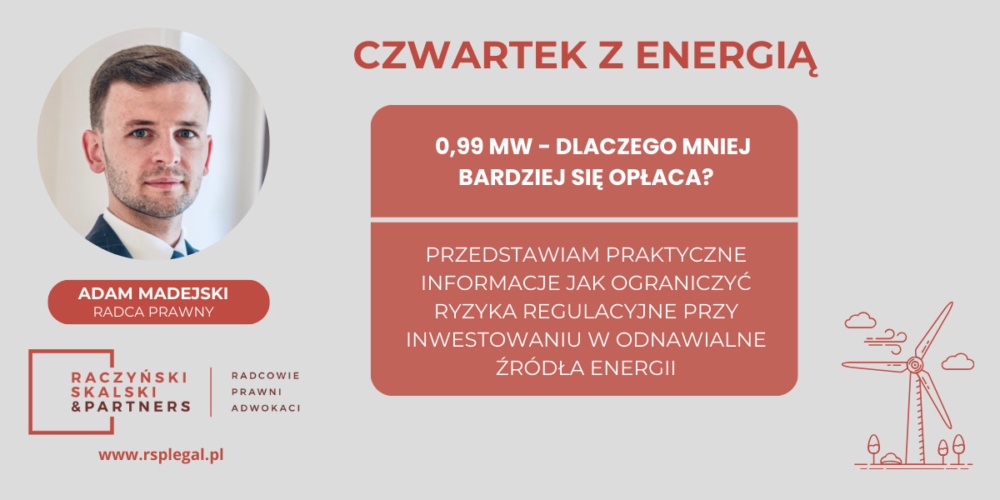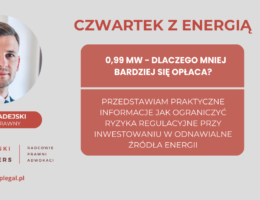Entrepreneurs eagerly decide to build their own generation sources – the prospect of covering at least part of the demand for electricity or the possibility of selling the generated energy to the grid are tempting solutions. However, it is worth remembering that, as a rule, electricity generation is a regulated activity, and the larger the power of the generating unit, the more restrictive the regulations.
1. Small installation – why choose it?
According to the definition in the Renewable Energy Sources Act, a small installation is a RES installation with an installed electrical power of more than 50 kW and no more than 1 MW, connected to a power grid with a voltage lower than 110 kV (Article 2 point 18 of the RES Act).
The definition makes two important points:
1. the highest power that a small installation can achieve is 999.9 kW, although it is recommended not to approach the limit,
2. the installation should be connected to a low- or medium-voltage grid. If an entrepreneur is connected to a 110 kV grid, he should review the idea of building a small installation.
Entrepreneurs are often tempted by the vision of building sources larger than 1 MW – the greater the power, the greater the savings, more energy and more energy sales to the grid. Unfortunately, such offers often do not take into account a number of legal obligations and risks that are associated with the operation of a source with a capacity greater than 1 MW. The mere fact that there is an obligation to obtain a license to generate electricity (Article 32(1)(1)(c) of the Energy Law), before operating the installation, makes it necessary to incur much greater organizational and financial expenses at the beginning of the investment.
When considering the construction of your own generation facility, you need to take into account not only the benefits of the amount of electricity generated, but, above all, the regulatory aspects of conducting such a business, and these may unpleasantly surprise you.
2. Entry in the MIOZE register vs. a license for electricity generation
As in the case of an electricity generation license, the start of the business of generating electricity in a small installation is possible only after obtaining an entry in the MIOZE register (Article 11a(2) of the RES Law). Unlike the concession procedure, however, registration in the MIOZE register is much less formalized, and the number of prerequisites to be met is much shorter.
Obtaining an entry in the MIOZE register requires (Article 10(1) and (2) of the RES Act):
-
-
- submission of an application for entry using the form available on the website of the Energy Regulatory Authority (https://bip.ure.gov.pl/bip/rejestry-i-bazy/wytworcy-energii-w-male/2138,Rejestr-wytworcow-energii-w-malej-instalacji.html);
- submission of a statement of awareness of the legal obligations incumbent on a generator entered in the MIOZE register,
- not being in arrears with payment of taxes, fees and insurance premiums,
-
The application is reviewed by the President of the ERO within 21 days, but if 28 days have passed from the submission of the application and the entry has not been made, the generator can start operations, i.e. start commercial use of the small installation.
Obtaining a license is much more complicated, and primarily involves the need to meet requirements regarding financial standing, providing guarantees of proper performance of the licensed activity, as well as employing people with the appropriate qualifications to operate the generating installation (Article 33(1)(2)-(4) of the Energy Law). While compliance with these conditions by large-scale entities may not be a problem, the performance of licensed activities is subject to a number of information obligations.
Among the most important requirements are:
-
-
- ensuring high quality of services, reliability of electricity supply while maintaining the principle of the lowest possible cost,
- prohibition of subsidizing unlicensed activity from the revenue generated from the licensed activity,
- obligation to inform about any registration changes of the generator, as well as about the planned split or merger,
- The obligation to inform about the planned termination of the licensed activity at least 18 months in advance,
- the obligation to submit a business plan for the licensed activity.
-
It is also important to note that a potential violation of obligations by a generator, in the case of operation of a small installation, will have far less severe consequences than in the case of an installation with a capacity of 1 MW and above. First and foremost, operating without the required license constitutes a criminal offense (Article 57g of the Energy Law), while failure to make the required entry in the MIOZE constitutes only an offense (Article 601 § 1 of the Code of Offenses). Potential financial liability is also dramatically different – the penalty for operating without the required license can be a fine of up to PLN 5,000,000 (Article 57g of the Energy Law), while the lack of an entry in the MIOZE register can result in an administrative penalty of PLN 1,000 (Article 170(4) of the RES Act).
Although energy generation as of January 1, 2024 is no longer subject to the obligation to make a deduction to the Price Difference Payment Fund, it is worth noting that in this mechanism the value determining the existence of an obligation on the part of the generator was precisely the capacity of the generating installation higher than 1 MW. From the legislator’s point of view, this limit turned out to be so important that, as a rule, generators in small installations were not covered by the rather onerous obligation to make a deduction to the Price Difference Payment Fund and submit monthly reports.
3 Summary
The juxtaposition of the rights and obligations of a generator who operates a small installation and an installation with a capacity of more than 1 MW shows the advantage of a small installation in those cases where the generating source is intended to support electricity demand or provide an additional source of income. If the generator is not targeting large-scale projects with a strictly commercial purpose, the recommended solution is to build a small (or several small) installations. Much smaller and less burdensome regulatory and financial risks, as well as much greater flexibility in the way business is conducted, make a small installation a good choice for all those who plan to invest in RES and want to treat it as a side business.



